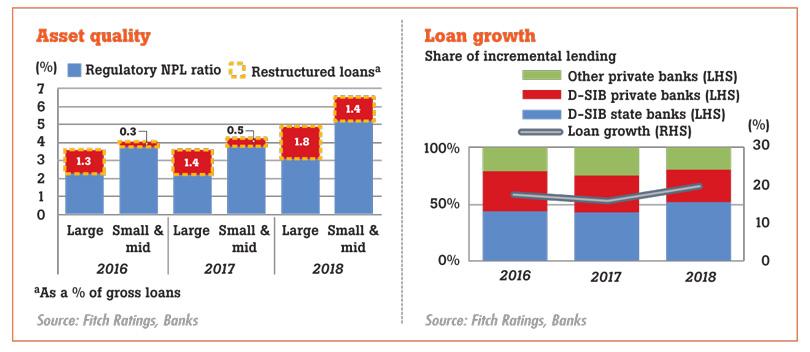28 Jun 2019 - {{hitsCtrl.values.hits}}

Fitch Ratings expect banking sector loan growth to slowdown in 2019 on muted private sector credit demand despite a recent a policy rate cut by the Central Bank to create credit demand and thus boost economic growth. “Our expectation is for loan growth to decelerate in 2019 (down by 0.4 percent in 1Q19) on muted private-sector credit demand,” Fitch said in a brief note.
According to the rating agency, loan growth remained subdued through the first nine months of 2018 at 13 percent. But the year closed with a 19.6 percent credit growth largely due to increased State borrowings.
“Three large State banks contributed about half of the incremental lending in 2018 (2017: 42 percent),” Fitch said.
Meanwhile, the rating agency expects asset quality pressures on bank to linger in 2019.
“Sector NPLs grew by 64 percent in 2018 – the sharpest increase since the pawning debacle in 2013 – driving the sector NPL ratio to 3.4 percent (2017: 2.5 percent).
This trend continued in 1Q19, with the sector NPL ratio rising further to 4.2 percent broadly in line with our expectations for 2019. The adoption of SLFRS 9 saw loan-loss allowances/gross loans increase to 3.7 percent (2017: 3 percent).”
Fitch said heightened risks, largely on the macro front are being manifested in the form of a sharp rise in non-performing loans (NPLs).
“As a result, pressure on profitability is likely to remain in 2019 from rising credit costs with SLFRS 9 implementation and weaker asset quality.
In addition, the debt-recovery levy imposed in late 2018 should push effective tax rates for the Fitch-rated banks even higher (2018: 49 percent, 2017: 44 percent), squeezing profits further,” the rating agency said.
Sector net profit declined by 9 percent in 2018 for the first time since 2013 as impairment charges more than doubled. This trend continued into 1Q19, with sector ROA declining from 1.1 percent in 2018 to 0.9 percent.
Fitch further said weaker earnings and asset-quality stress will add to capitalisation pressures despite the capital injections made by banks ahead of Basel III implementation.
“Capital-raising plans could face execution risks, with recent rights issues of banks being significantly undersubscribed,” the rating agency said.
Fitch maintains a Negative Outlook on Sri Lanka’s banking sector.
15 Nov 2024 8 minute ago
15 Nov 2024 1 hours ago
15 Nov 2024 1 hours ago
15 Nov 2024 1 hours ago
15 Nov 2024 2 hours ago